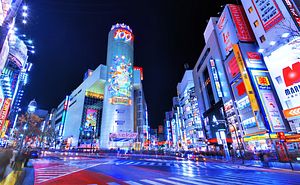As Prime Minister Shinzo Abe’s economic policies take hold, and the effects of April’s 3 percent consumption tax increase become evident, Japan’s consumers and businesses are reporting somewhat mixed results. Businesses are by and large showing substantial profits and planning new expansion. Consumer sentiment, however, is still not showing the effects of the tax increase. As Abe seeks to get more of the population working (and thus consuming), the government will have to find new incentives.
Japanese chain department stores are still reporting strong profits. Three of its main retailers are continuing to bask in the afterglow of the spike in spending just before the consumption tax increase. On Thursday J. Front Retailing Co., which owns the Matsuzakaya and Daimaru department chains, reported a record 18.7 percent increase in consolidated operating profit for the first fiscal quarter, year-on-year. Seven and I Holdings reported 77.5 billion yen ($760.62 million) in operating profits for the March to May period as well, a 5.1 percent increase over the previous year. The company, which operates the 7-Eleven chain of convenience stores, remains on target for a record expansion of 1,200 new stores in Japan by the end of the fiscal year in February. Japan’s third-largest retailer, Takashimaya Co Ltd, reported a first quarter operating profit increase of 3.6 percent, saying that the drop off in sales after the tax increase was expected, while sales before the increase were higher than expected.
However, a quarterly Bank of Japan survey for June showed that people feel worse off than they did the previous year. The Jiji Press reported that “43.7 pct of respondents said they have ‘less leeway in their lives than a year earlier,’ up 5.6 percentage points from the previous survey in March.” Some 42 percent of people reported spending more than the previous year, an increase of 5.9 percent.
While most of Abe’s new economic policies are aimed at businesses, such as reducing the corporate tax rate from 35 percent to below 30 percent over the next few years, there haven’t been many substantial or concrete policy proposals for increasing consumer demand. One of his economic policy aims is to increase the number of women in the workforce, which would theoretically increase demand if disposable household income increased as well, yet childcare remains expensive. On Thursday the government submitted a proposal for free preschool education for children between 3 and 5 years old. An advisory panel suggested that free education at nursery schools and kindergartens be made in stages. While Abe has said the proposal is a “reform that will substantially change” the Japanese education system, the means to pay for such a major investment are not available. While further tax increases (like the proposed increase in consumption tax to 10 percent next year) could provide the funds needed, their dampening effect on the economy and spending might cancel any gains.

































